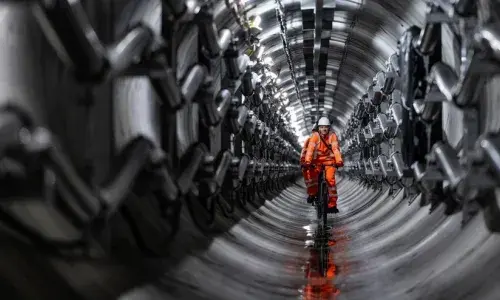
£1.3 million for National Grid to take forward three net zero innovation projects as part of Ofgem fund
- Ofgem scheme funds National Grid’s electricity transmission and distribution networks to the tune of £1.3 million to develop three innovation projects.
- Projects include developing a long-term strategy to reduce dependency on SF6, and using digital tools to support regional energy planning for low carbon technologies.
- The funding sees the projects progressing to the next stage of the regulator’s scheme to encourage innovation and help transform the UK’s energy systems in line with net zero.
Three National Grid-led projects developing electricity transmission and distribution network innovations will continue their work after securing £1.3 million for the next stage of Ofgem’s Strategic Innovation Fund (SIF) programme.
National Grid Electricity Transmission (NGET) has been awarded £875,000 for two projects that will help develop a secure net zero electricity network. Projects include development of a long-term strategy to remove electrical insulating gas SF6 from the network, and an initiative to introduce a new way to assess the resilience of the whole electricity system in Britain.
National Grid Electricity Distribution (NGED) has been awarded £499,874 for a project in partnership with West Midlands Combined Authority and Advanced Infrastructure to investigate integrating datasets from a variety of sources on a single digital platform, to support local decision-making on regional energy planning for net zero.
These projects are a great example of how we're collaborating to tackle some of energy’s biggest challenges with ambitious thinking.
Both NGET and NGED will be collaborating with the electricity system operator (ESO) on a separate SIF-funded Powering Wales Renewably project to accelerate low carbon energy in Wales. NGET will also collaborate on the Scottish and Southern Electricity Networks (SSEN)-led REACT project, whilst NGED is working with Wales and West Utilities (WWU) on the NextGen Electrolysis project.
See below for full project descriptions.
The projects are funded by energy network users and consumers through Ofgem’s SIF scheme, which is managed in partnership with Innovate UK.
Originally funded as part of the scheme’s discovery phase – which focuses on a project’s feasibility and potential benefits – the projects now progress to the alpha phase where work moves towards experimental development and testing solutions.
The innovation projects will provide critical learnings and research to help inform the future development of a net zero energy system, at the same time as delivering significant benefits to consumers.
Sean Coleman, Strategic Innovation Fund Manager at National Grid Electricity Transmission, said: “These projects are a great example of how National Grid and its partners in industry and academia are tackling some of energy’s biggest challenges with ambitious thinking.
“With this funding we’re able to progress a handful of exciting innovation projects, including putting a new lens on network resilience to help strengthen it in future, and work to reduce and eventually eliminate our dependency on the greenhouse gas SF6.
“Our innovation activity is playing a key role in helping to shape net zero in Britain, and in ensuring our energy networks are fit for the future while keeping costs down for consumers.”
Jenny Woodruff, Innovation Manager at National Grid Electricity Distribution, said: “The PRIDE project aims to establish how digital tools can support collaboration between distribution network operators and local authorities to create a more coordinated and integrated process when planning and connecting decarbonised heat and transport solutions.
“By sharing data, we can work even more closely together to help deliver Local Area Energy Plans, reducing cost and timescales, and ensuring the electricity network is ready ahead of need to ensure a cleaner and fairer energy future for all.”
Find out more in Ofgem's full SIF funding announcement
Full list of projects and SIF funding:
National Grid Electricity Transmission
SF6 whole life strategy – £403,000
Developing an economic, efficient, holistic replacement and management strategy for the greenhouse gas sulphur hexafluoride (SF6) that will help to deliver Great Britain’s ambition for a clean, affordable energy system. PROJECT PARTNERS: University of Manchester, SSEN, DNV, DILO, WIKA.
WELLNESS (Whole Energy System Resilience Vulnerability Assessment) – £472,000
Establishing the foundations to develop the first resilience vulnerability assessment for the whole electricity system in Great Britain. This will allow a standardised approach to large ‘Black Swan’ events (low probability events that have serious consequences). PROJECT PARTNERS: University of Manchester, University of Cyprus, Imperial College London, Electricity North West, Arup, Frazer Nash Consultancy.
National Grid Electricity Distribution
PRIDE (Planning Regional Infrastructure in a Digital Environment) – £499,874
Using digital tools to share data and work more closely with local authorities on an integrated approach to planning and connecting low carbon technologies. Network data (on factors such as capacity) will give local authorities greater insight when drawing up their Local Area Energy Plans and enable them to plan projects and investment in energy, transport, heating and housing. In return, we will obtain data from local authorities to help us plan and deliver network development and reinforcement where it’s needed most and ensure the network is ready ahead of need.
Partner-led projects
Powering Wales Renewably – led by the ESO
Network companies and local government collaborating to accelerate low-carbon energy in Wales, taking a whole electricity system approach.
REACT (Rapid Evaluation Areal Connection Tool) – led by Scottish and Southern Electricity Networks
Creating a geographical planning tool to help in connecting low-carbon energy technologies to the grid in the right places, while maintaining resilience.
NextGen Electrolysis – Wastewater to Green Hydrogen – led by Wales and West Utilities
Aiming to reduce the cost of producing hydrogen, by using wastewater rather than high-purity water for the electrolysis process.


